朱明zhubob-新思维综合英语2Unit8 语法知识点
- 格式:doc
- 大小:30.54 KB
- 文档页数:5
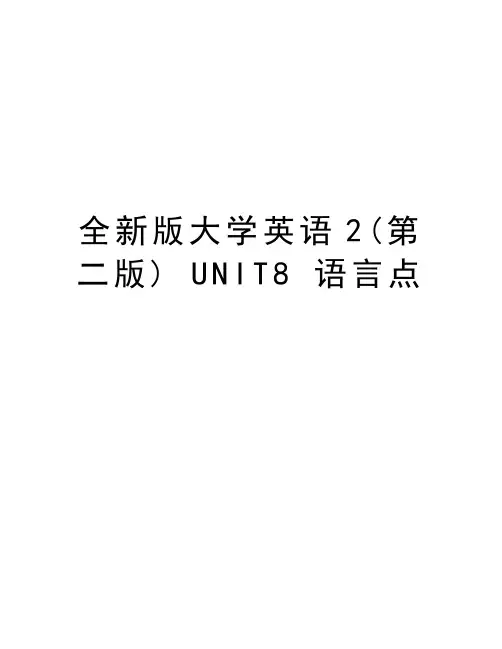
全新版大学英语2(第二版)U N I T8语言点Unit 8 Protecting Our EnvironmentWhen man is happy, he is in harmony with himself and his environment. —OscarWilde 人类幸福之时,亦即人类自身和谐生活且与环境和谐共处之时。
——奥斯卡·王尔德Detailed ReadingⅠ. Difficult Sentences1.(Para.1) In autumn, oak and maple and birch set up a blaze of colourthat flamed and flickered across a backdrop of pines.1. Paraphrase the sentence.(=In autumn, the leaves of oaks, maples and birches turned bright red against a background of green pines.)2. Translate this sentence into Chinese.(=秋季到来时,橡树、枫树和白桦树五彩缤纷,在大片松林的衬托下如同一片火海,熠熠生辉。
)2.(Para.2) The countryside was, in fact, famous for the abundance andvariety of its bird life, and when the flood of migrants was pouringthrough in spring and autumn people travelled from great distancesto observe them.1. Understand the long sentence.(=This is a compound sentence connected with the transitional word “and”. Inthe second main clause, a sub-clause of time “when the flood of…”is used.)2. Translate this sentence into Chinese.(=事实上,这里的乡村鸟类品种丰富,数量可观,因此远近闻名。
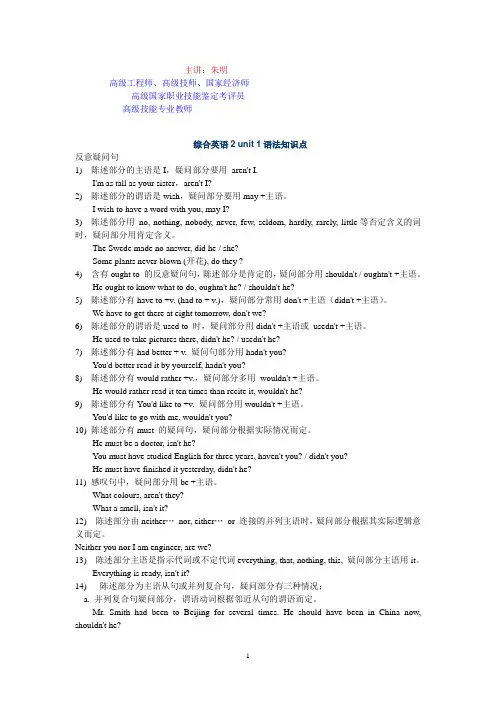
主讲:朱明高级工程师、高级技师、国家经济师高级国家职业技能鉴定考评员高级技能专业教师综合英语2 unit 1语法知识点反意疑问句1)陈述部分的主语是I,疑问部分要用aren't I.I'm as tall as your sister,aren't I?2)陈述部分的谓语是wish,疑问部分要用may +主语。
I wish to have a word with you, may I?3)陈述部分用no, nothing, nobody, never, few, seldom, hardly, rarely, little等否定含义的词时,疑问部分用肯定含义。
The Swede made no answer, did he / she?Some plants never blown (开花), do they ?4)含有ought to 的反意疑问句,陈述部分是肯定的,疑问部分用shouldn't / oughtn't +主语。
He ought to know what to do, oughtn't he? / shouldn't he?5)陈述部分有have to +v. (had to + v.),疑问部分常用don't +主语(didn't +主语)。
We have to get there at eight tomorrow, don't we?6)陈述部分的谓语是used to 时,疑问部分用didn't +主语或usedn't +主语。
He used to take pictures there, didn't he? / usedn't he?7)陈述部分有had better + v. 疑问句部分用hadn't you?You'd better read it by yourself, hadn't you?8)陈述部分有would rather +v.,疑问部分多用wouldn't +主语。
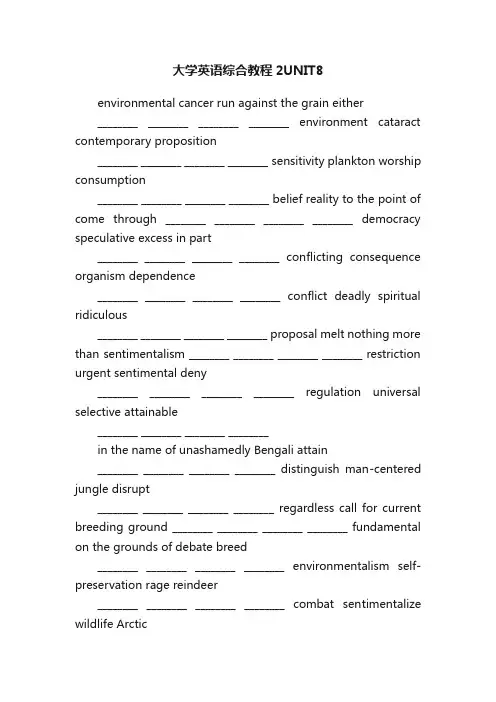
大学英语综合教程2UNIT8environmental cancer run against the grain either________ ________ ________ ________ environment cataract contemporary proposition________ ________ ________ ________ sensitivity plankton worship consumption________ ________ ________ ________ belief reality to the point of come through ________ ________ ________ ________ democracy speculative excess in part________ ________ ________ ________ conflicting consequence organism dependence________ ________ ________ ________ conflict deadly spiritual ridiculous________ ________ ________ ________ proposal melt nothing more than sentimentalism ________ ________ ________ ________ restriction urgent sentimental deny________ ________ ________ ________ regulation universal selective attainable________ ________ ________ ________in the name of unashamedly Bengali attain________ ________ ________ ________ distinguish man-centered jungle disrupt________ ________ ________ ________ regardless call for current breeding ground ________ ________ ________ ________ fundamental on the grounds of debate breed________ ________ ________ ________ environmentalism self-preservation rage reindeer________ ________ ________ ________ combat sentimentalize wildlife Arctic________ ________ ________ ________ ecological creature refuge mate________ ________ ________ ________ atmosphere resistance work one’s way similarly________ ________ ________ ________ ozone voter congress owl________ ________ ________ ________ layer vote exploration aesthetic________ ________ ________ ________ reduction snail darter conserve livelihood________ ________ ________ ________(自然)环境的癌,恶性肿瘤与…格格不入;违反意愿只能两者选择其一的________ ________ ________ ________环境白内障当代的,现代的提议;命题________ ________ ________ ________敏感(性)浮游生物崇拜,崇敬消费(量)________ ________ ________ ________信念;相信现实;真实达到…的程度经历;从…活下来________ ________ ________ ________民主(制度)猜测性的,推测的过渡,无节制在某种程度上;部分地________ ________ ________ ________不一致的,冲突的后果,结果生物体,有机体依靠,依赖________ ________ ________ ________冲突vi. 致命的,毁灭性的精神的;非物质的可笑的,荒谬的________ ________ ________ ________提议,建议融化,溶化无异于;只不过感情用事;多愁善感________ ________ ________ ________限制;限制性规定紧急的;急迫的感情用事的;多愁善感的不给;不准________ ________ ________ ________规章;规定全世界的;普遍的选择的;有选择性的可达到的;可得到的________ ________ ________ ________以…为由坦然地,满不在乎地孟加拉人;孟加拉语达到;取得________ ________ ________ ________区别,辨别以人为中心的杂乱无章的事物;丛林使陷于混乱;干扰________ ________ ________ ________不顾一切地;无论如何要求当前的,现在的动物繁殖的地方________ ________ ________ ________基本的,根本的因为;以…为理由辩论,争论繁殖;产________ ________ ________ ________环境保护论;环境论自我保护激烈的进行驯鹿________ ________ ________ ________斗争,战斗感情用事地对待野生动植物北极(的),北极圈(的)________ ________ ________ ________生态的;生态学的生物庇护所;避难处(使)交配________ ________ ________ ________大气;气氛反对,反抗设法抵达;努力达到目标同样地,相同地________ ________ ________ ________臭氧投票者,选举人国会;立法机关猫头鹰________ ________ ________ ________层投票选举勘查,探测;探索美学的;美感的;美的________ ________ ________ ________减少蜗牛鱼保护,保存生计________ ________ ________ ________logging accommodate lesser moderate________ ________ ________ ________log fate pollutant concern________ ________ ________ ________ distinction bind generatorframe________ ________ ________ ________ charge e.g. fatal frame of mind ________ ________ ________ ________ well-being atmospheric ecosystem humanistic________ ________ ________ ________ accommodate threat________ ________106 words伐木业适应;容纳n. 较小的,更少的,次要的适中的;适度的________ ________ ________ ________砍伐;伐(木)命运;结局污染物有利害关系的事;担忧________ ________ ________ ________区别,差别捆;将…绑在一起发电机状态;框架________ ________ ________ ________被照顾的人例如致命的;毁灭性的心绪;心境________ ________ ________ ________幸福;福祉大气的生态系统人本主义的________ ________ ________ ________适应新的情况;迁就威胁________ ________106 单词。
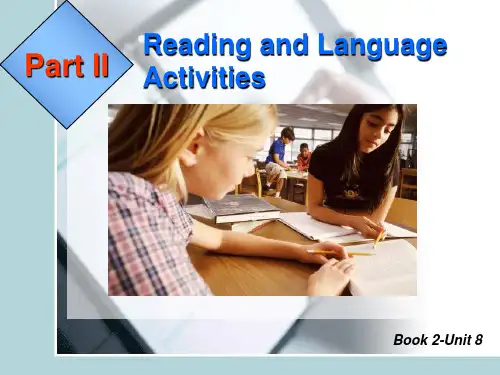
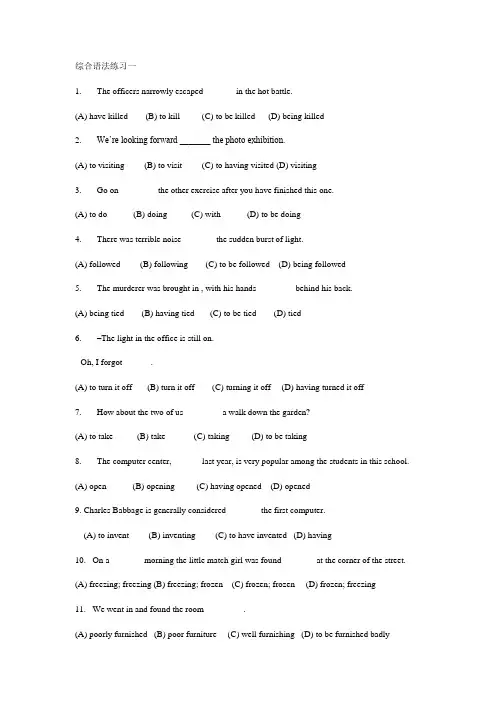
综合语法练习一1. The officers narrowly escaped_______ in the hot battle.(A) have killed (B) to kill (C) to be killed (D) being killed2. We’re looking forward _______ the photo exhibition.(A) to visiting (B) to visit (C) to having visited (D) visiting3. Go on ________ the other exercise after you have finished this one.(A) to do (B) doing (C) with (D) to be doing4. There was terrible noise _______ the sudden burst of light.(A) followed (B) following (C) to be followed (D) being followed5. The murderer was brought in , with his hands ________ behind his back.(A) being tied (B) having tied (C) to be tied (D) tied6. –The light in the office is still on.--Oh, I forgot ______.(A) to turn it off (B) turn it off (C) turning it off (D) having turned it off7. How about the two of us ________ a walk down the garden?(A) to take (B) take (C) taking (D) to be taking8. The computer center, ______ last year, is very popular among the students in this school.(A) open (B) opening (C) having opened (D) opened9. Charles Babbage is generally considered _______ the first computer.(A) to invent (B) inventing (C) to have invented (D) having10. On a _______ morning the little match girl was found _______ at the corner of the street.(A) freezing; freezing (B) freezing; frozen (C) frozen; frozen (D) frozen; freezing11. We went in and found the room_________.(A) poorly furnished (B) poor furniture (C) well furnishing (D) to be furnished badly12. The students expected there ________ more reviewing classes before the final exams.(A) is (B) being (C) have been (D) to be13. In those days my family didn’t have enough room__________.(A) to live (B) living in (C) to live in (D) living14. He likes _________ , but he doesn’t like _______ today because it is too cold.(A) to swim; to swim (B) swimming; swimming(C) to swim; swimming (D) swimming; to swim15. Since he doesn’t want to accept your advice. It is no use ________ to him again.(A) in talking (B) talking (C) to talk (D) of talk16. Have you any objection to __________ to Beijing by air?(A) be going (B) going (C) go (D) went17. We regret ________ that the movie was not worth_________.(A) to say; to see(B) to say; seeing (C) saying; to see (D) saying; to seeing18. ________ the book, the writer tried _______ a publisher.(A) Finishing; finding (B) Having finished; to find(C) To finish; to find (D) Being finished; finding19. He couldn’t open the window, so he tried ________ it.(A) push (B) to push (C) pushed (D) pushing20. If you want a letter ________, you must kept in mind several rules while________.(A) written; written (B) well written; writing(C) well writing; writing (D) well written; written21.________ from the hill, the little village looks more beautiful.(A) To see (B) Being seen (C) Seeing (D) Seen22.The police caught the thief _________ the book.(A) steal (B) to steal (C) stealing (D) stole23.“Why were you late?”“I had a hard time ________ up this morning.”(A) to get (B) get (C) got (D) getting24.I won’t pay 35 dollars for the coat; it’s not worth_________.(A) all that much (B) that much (C) that all much (D) much all that25.The speaker, _______ for her splendid speeches, was warmly received by the audience.(A) having known (B) knowing (C) being known (D) know26.The man was seen _______ down and the driver driving away.(A) knock (B) be knocked (C) knocked (D) having knocked27.Seceral girl s ________ towards the playground at about nine o’clock.(A) were seen run (B) saw running(C) were seen running (D) have been seen running28.She is often heard _______ English aloud in the morning.(A) to read (B) sang (C) to have sung (D) to be reading29.I got a letter from Patricia this morning, ________ that she’s expecting another baby.(A) saying (B) writing (C) telling (D) speaking30.The servant went upstairs. Soon he returned and asked_______.(A) Jone to follow him (B) Jone follow him (C) Jone followed him (D) Jone follows him31.The teacher doesn’t permit _________ in class.(A) smoke (B) to smoke (C) smoking (D) to have a smoke32.________ the meeting himself gave them a great deal of encouragement.(A) The mayor will attend (B) The mayor to attend(C) The mayor attending (D) The mayor’s attending33.You r hair needs________ . You’d better have it ________ tomorrow.(A) to be cut; do (B) cutting; doing (C) to be cut; done (D) cutting; to be done34.The child pretended _________ to what his mother was saying.(A) to be not listening (B) not listening (C) not to be listening (D) listening35.______ in pencil, the letter was difficult________ out.(A) Being written; in making (B) Written; to make(C) Having written; to make (D) Having been written; making36.“Do you all understand what I mean? I try to make me ________ by all of you.”(A) understand (B) understood (C) to understand (D) understanding37.New ways have been found to prevent the river_________.(A) not to be polluted (B) against polluting (C) from polluting (D) from being polluted38.Having been delayed by heavy snow,_________.(A) they arrived late(B) it is impossible for them to arrive on time(C) it led to them being late(D) their friend thought that they would be late39.________ , I couldn’t enter the room.(A) To lose my key (B) My key has lost(C) My key to be lost (D) My key having been lost40.I intended _______ that year, but my mother suddenly fell ill.(A) to go abroad (B) having gone abroad(C) to have gone abroad (D) going abroad41.He has no choice but ________ to see him.(A) to go (B) go (C) going (D) goes42._________ him do this job by himself?(A) Why not let (B) Why don’t let(C) Why not to let (D) Why you not to let43.He moved away from his parents and missed them ______ enjoy the exciting life in New York.(A) too much to (B) very much to (C) much so as to (D) enough to44. ________ the weather was going to take a turn for the worse, we decided to stay at home.(A) But that (B) As for (C) Seeing that (D) As to45.I don’t like _______ with me a bout religion.(A) them joking (B) their joke (C) that they joke (D) them joke46.When the streets are full of melting snow, you can’t help _______ your shoes wet.(A) get (B) to get (C) but get (D) but getting47.“Would you join us in the game this afternoon?”“Oh. I ________ but I but an appointment.”(A) would love to so (B) would love it (C) would love to (D) would love to do48.To succeed in a difficult task, _________.(A) one needs to be persistent (B) persistence is need(C) you need be a persistent person (D) persistence is what one needs49.There was nothing they could do but _______ for a mechanic to arrive.(A) to wait (B) waiting (C) wait (D) waited50.He finds himself _______ by too many phone calls every day.(A) troubling (B) troubled (C) to be troubled (D) that I should say。
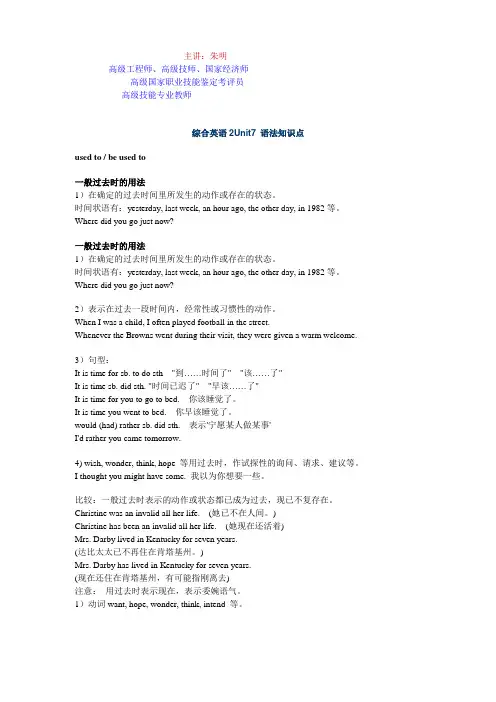
主讲:朱明高级工程师、高级技师、国家经济师高级国家职业技能鉴定考评员高级技能专业教师综合英语2Unit7 语法知识点used to / be used to一般过去时的用法1)在确定的过去时间里所发生的动作或存在的状态。
时间状语有:yesterday, last week, an hour ago, the other day, in 1982等。
Where did you go just now?一般过去时的用法1)在确定的过去时间里所发生的动作或存在的状态。
时间状语有:yesterday, last week, an hour ago, the other day, in 1982等。
Where did you go just now?2)表示在过去一段时间内,经常性或习惯性的动作。
When I was a child, I often played football in the street.Whenever the Browns went during their visit, they were given a warm welcome.3)句型:It is time for sb. to do sth"到……时间了""该……了"It is time sb. did sth. "时间已迟了""早该……了"It is time for you to go to bed.你该睡觉了。
It is time you went to bed.你早该睡觉了。
would (had) rather sb. did sth.表示'宁愿某人做某事'I'd rather you came tomorrow.4) wish, wonder, think, hope 等用过去时,作试探性的询问、请求、建议等。
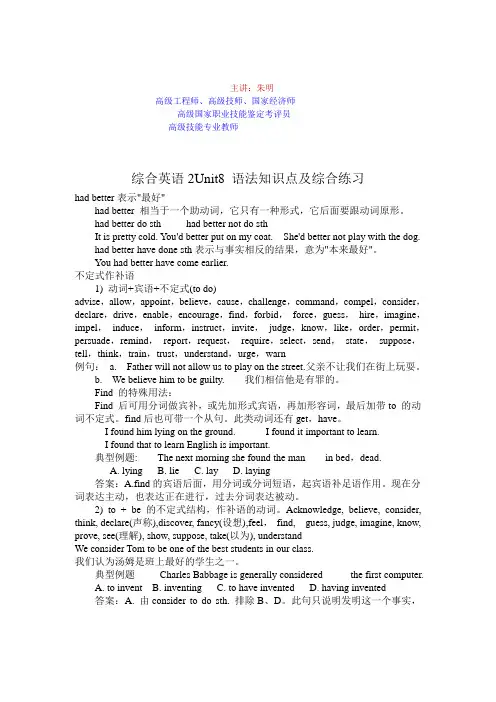
主讲:朱明高级工程师、高级技师、国家经济师高级国家职业技能鉴定考评员高级技能专业教师综合英语2Unit8 语法知识点及综合练习had better表示"最好"had better 相当于一个助动词,它只有一种形式,它后面要跟动词原形。
had better do sth had better not do sthIt is pretty cold. You'd better put on my coat.She'd better not play with the dog.had better have done sth表示与事实相反的结果,意为"本来最好"。
You had better have come earlier.不定式作补语1) 动词+宾语+不定式(to do)advise,allow,appoint,believe,cause,challenge,command,compel,consider,declare,drive,enable,encourage,find,forbid,force,guess,hire,imagine,impel,induce,inform,instruct,invite,judge,know,like,order,permit,persuade,remind,report,request,require,select,send,state,suppose,tell,think,train,trust,understand,urge,warn例句:a.Father will not allow us to play on the street.父亲不让我们在街上玩耍。
b.We believe him to be guilty.我们相信他是有罪的。
Find 的特殊用法:Find 后可用分词做宾补,或先加形式宾语,再加形容词,最后加带to 的动词不定式。
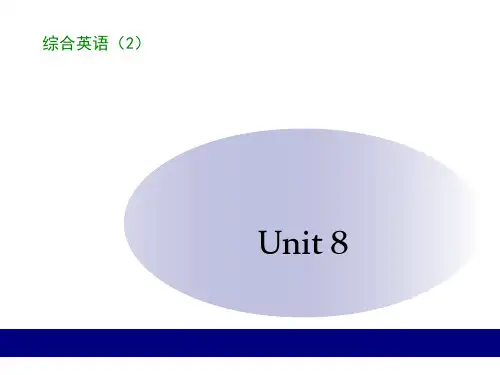
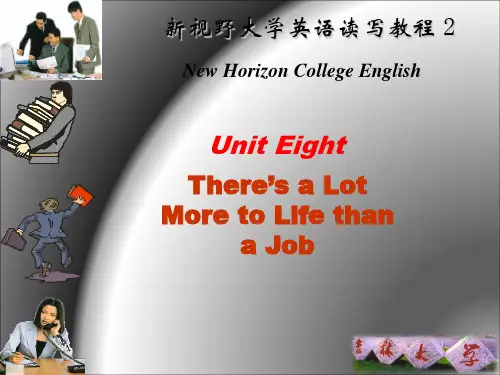
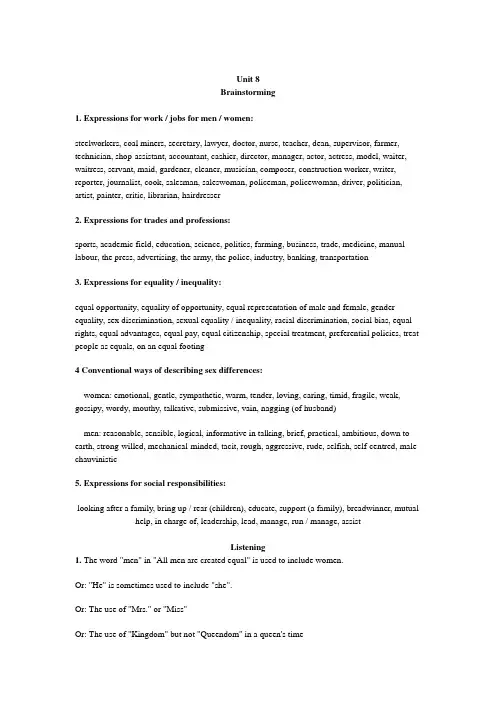
Unit 8Brainstorming1. Expressions for work / jobs for men / women:steelworkers, coal miners, secretary, lawyer, doctor, nurse, teacher, dean, supervisor, farmer, technician, shop-assistant, accountant, cashier, director, manager, actor, actress, model, waiter, waitress, servant, maid, gardener, cleaner, musician, composer, construction worker, writer, reporter, journalist, cook, salesman, saleswoman, policeman, policewoman, driver, politician, artist, painter, critic, librarian, hairdresser2. Expressions for trades and professions:sports, academic field, education, science, politics, farming, business, trade, medicine, manual labour, the press, advertising, the army, the police, industry, banking, transportation3. Expressions for equality / inequality:equal opportunity, equality of opportunity, equal representation of male and female, gender equality, sex discrimination, sexual equality / inequality, racial discrimination, social bias, equal rights, equal advantages, equal pay, equal citizenship, special treatment, preferential policies, treat people as equals, on an equal footing4 Conventional ways of describing sex differences:women: emotional, gentle, sympathetic, warm, tender, loving, caring, timid, fragile, weak, gossipy, wordy, mouthy, talkative, submissive, vain, nagging (of husband)men: reasonable, sensible, logical, informative in talking, brief, practical, ambitious, down to earth, strong-willed, mechanical-minded, tacit, rough, aggressive, rude, selfish, self-centred, male- chauvinistic5. Expressions for social responsibilities:looking after a family, bring up / rear (children), educate, support (a family), breadwinner, mutual help, in charge of, leadership, lead, manage, run / manage, assistListening1. The word "men" in "All men are created equal" is used to include women.Or: "He" is sometimes used to include "she".Or: The use of "Mrs." or "Miss"Or: The use of "Kingdom" but not "Queendom" in a queen's time2. Mr. Wright believes that sex discrimination still exists and men still carry on a sex war against women. Some men look down on women and they continue to regard women as second-rate citizens3. There are many jobs women can't do, or can't do well.Or: Women are unreliable and irrational.Or: Women depend too little on cool reasoning and too much on intuition and instinct to arrive at decisions.Or: Women are not capable of thinking clearly.4. According to Mr. Wright, there would be more peace and fewer wars if women were in control of international negotiations, because women are more peace-loving than menMain IdeaThe text presents a tragic story of the consequences of sex prejudice through describing the tragic fate of three gifted girls: Anne, Emily, and Charlotte Bronte in the history of English literature. Their father put all of his eggs in his remarkable solo sin but gave up three other daughters who were as clear as the son. However, to the opposite, at last the son died a failure, the three daughters established their fames as famous writers. The three girls sacrificed much of their literary talent, youth and energy for their brother who turned out to be a failure.Text AnalysisPara 1 During my youth in America’s … the gifts of the so-called weaker sex.[summary] In America’s Appalachian mountains, the author learned that farmers traditionally preferred sons over daughters because boys were better at heavy farm labour.1.During my youth in America’s Appalachian mountains, I learned that farmers preferred sonsover daughters, largely because boys were better at heavy farm labour.American’s Appalachian mountains: a mountain range in East North Americaextending 2 400 km from South Quebec Province in Canada to North Alabama in theUSprefer (sth. over / to sth.): choose sth. rather than sth. else; like sth. betterI prefers coffee to tea.There father prefers them to be home early.[note]When we talk about general preference, we use prefer doing sth. When we talk about preference in a specific situation, we use prefer to do sth. When we talk about two things, we use prefer doing sth. to doing sth. / prefer sth. to sth.Do you like swimming? Yes, but I prefer sailing.Can I give you a lift? No, thanks, I prefer to walk.I prefer sailing to swimming.be better at: comparative of be good at; greater in excellence or higher in quality than another of the same class, set, or kind.My sister is better at writing .2.With only 3% of Americans in agriculture today, brain has supplanted brawn, yet culturalpreferences, like bad habits, are easier to make than break.[paraphrase] In today’s America, only 3% of Americans are in agriculture. People work by meansof intelligence, not by physical strength.brain has supplanted brawn: Brawn refers to strong, well-developed muscles while brain indicates intellectual power. With fewer people in agriculture, intelligence is valued more than muscular strength. Also, notice that brain and brawn is a case of alliteration--- a rhetorical device that involves two or more stressed syllables with the same sound at the initial positions. Sometimes, the meaning of the two words where alliteration occurs are antonymous or synonymous, e.g. friend and foe; weal and woe; penny wise, pound foolish; He is all fire and fight. supplant: (fml) to displace and substitute for (another)The word processor has largely supplanted electric typewriters.Oil has supplanted coffee as our main export.brawn: muscular strength and powerIt’s a job needing brains rather than brawn.cultural preferences: traditionally biased opinion in favor of something or some type of people.3.But history warns repeatedly of the tragic cost of dismissing too casually the gifts of theso-called weaker sex.[paraphrase] But history warns repeatedly that if we ignore the talent of the female, so-called weaker sex, we will pay for that.warn: to make aware in advance of actual or potential harm, danger, or evil; give sb notice of sth, esp. possible danger or unpleasant consequences; inform sb in advance of what may happenShe has been warned of the danger of driving the car in that state.They warned her that if she did it again she would be sent to prison.The police warned them off the posted property.They called and warned me that they might be delayed.[synonyms]warn caution forewarnThese verbs mean to give someone notice of and put the person on guard against actual or possible danger or risk.Warn, the most inclusive, implies well-timed notice that causes a person to be alert, vigilant, or wary:My father was warned by the neighbors that we were in great danger.Caution often suggests a warning that calls for the use of circumspection or prudence,as in avoiding unpleasant consequences:The Secretary of State cautioned that terrorism would be countered by retaliatory action. Forewarn intensifies the sense of advance notice:Forewarned is forearmed.dismiss: to end the employment or service of; discharge; to direct or allow to leaveHe was dismissed for insubordination. The chairman dismissed the meeting.gift: a talent, an endowment, an aptitude, or a bent.He is a man of many gifts. He has a gift for poetry.the weaker sex / fair sex: It refers to females. The term presupposes that women are weaker than men and is thus considered as carrying undertones of sex discrimination.Para 2About 150 years ago, a village…remarkable talent in both art and literature.[summary] Mr. Bronte invested all his hopes in his son, not his three daughters.About 150 years ago, a village church vicar in Yorkshire, England, had three lovely, intelligentdaughters but his hopes hinged entirely on the sole male heir, Branwell, a youth with remarkable talent in both art and literature.hinge: to consider or make (something) dependent on something else; predicateThis plan hinges on her approval.Everything hinges on the outcome of these talks.sole: one and only; singleIt’s the sole cause of the accident. She is the sole survivor of the crash.Para 3 Branwell’s father and sisters …, a penniless failure.1.Branwell’s father and sisters hoarded their pennies to pack him off to London’s Royal Academy of Arts, but if art was his calling, he dialed a wrong number.[paraphrase]Branwell’s father and sisters set aside all their earning to send him to London’s Royal Academy of Arts, but although the boy took art as his career, he didn’t know how to approach it in the right way, i.e. he made a wrong choice.hoard their pennies: save every penny. The verb hoard indicates the thrifty life the family led in order to save every penny.hoard: to gather,save or accumulateShe hoards her money and she never spends it.People found hoarding during the famine were punished.to pack him off to: sent him to (preparing the luggage and providing fare for him)When the Christmas season was over, the parents packed the children off to the boarding school. pack: 1) to fold, roll, or combine into a bundle; wrap up2) put sth into a container for transport or storing; fill with sth.He takes a packed lunch to work every day.The show played to packed houses.[idioms] pack one’s bags: (prepare to) leavepack sth away: put sth into a box, cupboard, etc because it is not neededpack in: stop doing or saying sth that angers or annoys sb elsepack sb. off: send sb away, esp quickly and decisivelypack up: put into causes, etc before leaving a placeLondon’s Royal Academy of Arts: principal British art organization, located in London, established for the purpose of improving and encouraging painting, sculpture, and architecture in Great Britain. It was founded in 1768 by king George Ⅲ. The academy society has a large collection of valuable works of art, including the Taddei Tondo by Michelangelo, as well as the diploma works of nearly all the Royal Academicians. The art schools of the academy are now open to post-graduate students.2.Within weeks he hightailed it home, a penniless failure.[paraphrase] A few weeks later, he ran back home like a defeated dog in a great hurry.hightail it: escape, run quickly 仓皇奔逃They hightailed it from the danger zones. I hightailed it all this way.hightail: v. (colloq.) hurry I hightailed out of there.Para 4Hopes still high, the family landed …he deserved. Failure again.1.Hopes still high, the family landed Branwell a job as a private tutor, hoping this would free him to develop his literature skills and achieve the success and fame that he deserved.the family landed Brawnwell a job …: The family found Brawnwell a job. The verb land implies the job was not a happy one for Brawnwell.land: (colloq.) find, getShe landed a job as a bank clerk. The coach hoped to land two first-class players.She has landed more than 20 TV-drama plays in six years.free sb. to do: not controlled by obligation or the will of anotherYou’d better free him to do that work.You’re free to come and go as you ple ase.You are free to do as you wish.deserve: to be worthy of; meritThese people deserve our help. He richly deserved all that happened to him.Para 5 For years the selfless sisters squelched… three anonymous sisters?1. For years the selfless sisters squelched their own goals, farming themselves out as teachers and governesses in support of their increasingly indebted brother, convinced that the world must eventually recognise his genius.squelch their own goals: sacrifice their own ambitionssquelch: v. to crush by or as if by trampling; squash; to put down as with a crushing retortThe president wants to squelch any perception that the meeting is an attempt to negotiate.The army squelched the student demonstration.farming themselves out: going out to work for a wagefarm out: send out or delegate to be done by otherWe’re so busy we have to farm out a lot of work.convince: to bring by the use of argument or evidence to firm belief or a course of action.He convinced me that I should study law. It took many hours to convince the court of his guilt. Cf. convince persuadeAccording to a traditional rule, one persuades someone to act but convinces someone of the truth of a statement or proposition:By convincing me that no good could come of staying, he persuaded me to leave.If the distinction is accepted, then convince should not be used with an infinitive:He persuaded (not convinced) me to go.In an earlier survey, a majority of the Usage Panel held that this distinction should be maintained, but the use of convince with an infinitive has become increasingly common even among reputable writers, and it is unlikely that this structure can be maintained for much longer.2.As failures multiplied, Branwell turned to alcohol, then opium, and eventually died as he hadlived: a failure.[paraphrase]Branwell failed again and again, and he addicted to alcoholic drink. He died a failure just as he was a failure when he was alive.multiply: to increase the amount, number, or degree of.Our problems have multiplied since last year.It is possible to multiply bacteria and other living organisms in the laboratory.turn to something / doing something:1) to direct one’s attention to and begin to do it regularly.2) go to sb / sth for help, advice, etc.Si nce you don’t have a gift for music, you’d better turn to painting.She has nobody she can turn to.The more depressed he got, the more he turned to drink.[idioms]as it turned out: as was shown or proved by later eventsturn round and do sth.: say or do sth that displeases sb.turn against: become unfriendly or hostile towards sb.turn away: refuse to allow sb to enter a place; refuse to give help or support to sb.turn down: reject or refuse to considerturn sth in: give back sth that one no longer needs; return sth.turn off: leave one road in order to travel on another3.So died hope in the one male --- but what of the three anonymous sisters?[paraphrase] so the hope in the sole son overturned, but how about his three sisters who write anonymously?Para 6 During Branwell’s last years, …they sold only 2 copies.在勃兰威尔最后的几年里,三姐妹自费出版了一部诗集(用的是笔名,怕引起评论家的性别歧视),但只售出了两本。

新视野三版读写B2 U8 Text AAnimals or children? — A scientist's choice1 I am the enemy! I am one of those cursed, cruel physician scientists involved in animal research. These rumors sting, for I have never thought of myself as an evil person. I became a children's doctor because of my love for children and my supreme desire to keep them healthy. During medical schooland residency, I saw many children die of cancer and bloodshed from injury —circumstances against which medicine has made great progress but stil has a long way to go. More importantly, I also saw children healthy thanks to advances in medical science such as infant breathing support, powerful new medicines and surgical techniques and the entire fieldof organ transplantation. My desire to tip the scales in favor of healthy, happy children drew me to medical research.*2M y accusers have twisted the truth into a fable and cast me asthe devil. They claim that I have no moral compass, that I torture innocent animals for the sole purpose of career advancement, and that my experiments have no relevance to medicine.Meanwhile, an uncaring public barely watches, convinced that the issue has no significance,and publicity-conscious senators and politicians increasingly give way tothe lobbying of animal rights activists.3 We, in medical research, have also been unbelievably uncaring. We haveal owed the most extreme animal rights protesters to creep in and frame the issue as one of "animal fraud" and hatred. We have persisted in our belief that a knowledgeable public would consent to the importance of animal research for public health. Perhaps we have been mistaken in not responding to the emotional tone of the argument. Perhaps we should have responded to those sad slogans and posters of animals by waving equal y sad posters of children dying of cancer or external wounds.4 In the animal rights forum, much is made of the volume of pain these animals experience in the name of medical science.Activists deny that we are trying to help and say it is evidence of our evil and cruel nature. A more reasonable argument, however, can be advanced in our defense. Life is often cruel to animals and human beings. Teenagers are flung from trucks and suffer severe head injuries. Young children barely able to walk find themselves at the bottom of swimming pools while a parent is occupied with something else. Fromeveryday germs to gang violence, no life is free of pain. Physicians hoping to relieve the eternal suffering of these tragedies have only three choices: 1) create an animal model of the problem to understand the process and test new therapies; 2) experiment on human beings (some experiments wil succeed, most wil fail); or 3) leave medical knowledge static, hoping that accidental discoveries wil lead us forward.5 Some animal rights activists would suggest an optional fourth choice,*******claiming that computer models can create a nimal experiments,thus omitting actual experiments. Computers can imitate the effects ofwel -understood principles on complex systems, as in the application of the laws of physics to airplane and automobile design. However, when the principles themselves are in question, as is the case with the complex biological systems of human life under study, computer modeling alone is of little value.6 One of the terrifying effects of arresting the use of animals in medical research is that the impact wil not be felt for years or even decades. Drugs to cure infection wil remain undiscovered, surgical and diagnostic techniques wil remain undeveloped, and fundamental biological processes that might have been understood wil remain mysteries. There is the danger that quick decisions by wel -meaning politicians wil create resolution to diplomatical y satisfy the smal minority of loud protesters while the consequences and damaging impact of those decisions wil not be apparent until long after.7 Fortunately, most of us enjoy good health, and the agony of watching one's child die has become a rare experience. Yet our good fortune should not make us unappreciative. Protection from serious sickness and drugs to combat heart *disease, high blood pressure and stroke are al based on animal research. Most complex surgical procedures such as heart or hip surgery and organ transplantation surgeries were initial y developed in animals. Techniques to replace defective genes, the cause of so much disease, as wel as the development of synthetic organs are presently undergoing animal studies. These studies, and any subsequent advances, wil effectively end if animal research is severely restricted.8 In America today, death has become an event isolated from our daily existence. As a doctor who has watched many children die and seen their parents' infinite grief, I am particularly angered by any minute expression of caring for the suffering of creatures and so little for sick and dying humanbeings. People are too protected from the reality of human life and death andwhat it means.9 Make no mistake, however. I would never advocate needless cruel treatmentof animals. The animal rights movement has made a contribution in making us more aware of animals' needs and the need to search harder for suitable alternatives. But if the more radical members of this movement are successfulin threatening further research, their efforts wil bring about a tragedy that wilcost many lives. Hence the real question is whether an uncaring majority canbe aroused to protect its future against a loud, but misdirected, minority. Language Points:1 Animals or children? — A scientist’s choice (Title)Meaning: A scientist is now facing two choices: in favor of animals or children.2 I am the enemy! I am one of those cursed, cruel physician scientists involved inanimal research. These rumors sting, for I have never thought of myself as an evilperson. (Para. 1)Meaning: I am the enemy–the one who is condemned as a cold-hearted physician scientist doing animal research. These rumors make me upset as I've never consideredmyself as being evil.Meaning beyond words: The physician’s ironic tone in the sentences well reflects hisindignation and anger at the animal rights activists.3 I became a children’s doctor because of my love for children and my supremedesire to keep them healthy. (Para. 1)Meaning: My love for children and strong desire to keep them healthy drove me to be achildren’s doctor.Usage note: supreme, superior, super, superb*supreme, superior, super, superb都是形容词,且词形相近。
主讲:朱明高级工程师、高级技师、国家经济师高级国家职业技能鉴定考评员高级技能专业教师综合英语2 Unite 21. State a preference. 如何谈论个人偏爱。
2. Talk about habits . 谈论自己的习惯。
3. Express anticipation. 表示对某事的预料4. Talk about strengths and weakness. 谈论强项和弱项。
重要的语言形式1. the usage of the phrase “be used to ”.短语“be used to”的用法。
2. how to distinguish “so” and “such”。
如何区分“so”和“such”。
3. to use gerunds.动名词的用法。
Lesson 08Language points in the dialogueA:David:I'm impressed. When you gave directions to the taxi driver, you sounded just like a native.Mary: Well, not quite. I still have trouble expressing myself.1.be impressed with sth. “对…印象很深”[eg.]David is impressed with Mary's Chinese. 玛莉的汉语给大卫留下了很深的印象。
2.sound like…:“听起来像”。
Like: prep.“像”。
Just=quite:“很、非常”。
Sound just like:“听起来就像…一样”。
native: “本地人”、“本族人”。
3.not quite!对待别人的夸奖,英语国家的人一般回答:“thank you”。
但有时也可说:not quite. Quite = exactly,“其实并不是完全像对方说的那样的”。
主讲:朱明高级工程师、高级技师、国家经济师高级国家职业技能鉴定考评员高级技能专业教师综合英语2 Unit 4语法知识点every /no/all/ both/ neither/ nor1)不定代词有all , both, every, each, either, neither, more, little, few, much, many, another, other, some, any , one, no 以及some, something, anything, everything, somebody, someone, anybody, anyone, nothing , nobody, no one, none, everybody, everyone等。
2)不定代词的功能与用法a.除every 和no外不定代词既可用作名词,也可用作形容词。
every和no在句中只能作定语。
如: I have no idea about it.b.all:都,指三者以上。
all 的主谓一致:all的单复数由它所修饰或指代的名词的单复数决定。
如: All goes well.一切进展得很好。
all 通常不与可数名词单数连用,如:不说all the book,而说the whole book。
但all可与表时间的可数名词单数连用,如all day,all night,all the year;但习惯上不说all hour,all century。
all还可以与一些特殊的单数名词连用,如all China,all the city,all my life,all the way。
3)both:都,指两者。
a.both 与复数动词连用,但both… and…可与单数名词连用。
b.both, all 都可作同位语,其位置在行为动词前,be 动词之后。
如果助动词或情态动词后面的实义动词省去,则位于助动词或情态动词之前。
主讲:朱明高级工程师、高级技师、国家经济师高级国家职业技能鉴定考评员高级技能专业教师综合英语2Unit8 语法知识点had better表示"最好"had better 相当于一个助动词,它只有一种形式,它后面要跟动词原形。
had better do sthhad better not do sthIt is pretty cold. You'd better put on my coat.She'd better not play with the dog.had better have done sth表示与事实相反的结果,意为"本来最好"。
You had better have come earlier.不定式作补语1) 动词+宾语+不定式(to do)advise,allow,appoint,believe,cause,challenge,command,compel,consider,declare,drive,enable,encourage,find,forbid,force,guess,hire,imagine,impel,induce,inform,instruct,invite,judge,know,like,order,permit,persuade,remind,report,request,require,select,send,state,suppose,tell,think,train,trust,understand,urge,warn例句:a.Father will not allow us to play on the street.父亲不让我们在街上玩耍。
b.We believe him to be guilty.我们相信他是有罪的。
Find 的特殊用法:Find 后可用分词做宾补,或先加形式宾语,再加形容词,最后加带to 的动词不定式。
find后也可带一个从句。
此类动词还有get,have。
I found him lying on the ground.I found it important to learn.I found that to learn English is important.典型例题:The next morning she found the man ___ in bed,dead.A. lyingB. lieC. layD. laying答案:A.find的宾语后面,用分词或分词短语,起宾语补足语作用。
现在分词表达主动,也表达正在进行,过去分词表达被动。
2) to + be 的不定式结构,作补语的动词。
Acknowledge, believe, consider, think, declare(声称),discover, fancy(设想),feel,find,guess, judge, imagine, know, prove, see(理解), show, suppose, take(以为), understandWe consider Tom to be one of the best students in our class.我们认为汤姆是班上最好的学生之一。
典型例题Charles Babbage is generally considered___ the first computer.A. to inventB. inventingC. to have inventedD. having invented答案:A. 由consider to do sth. 排除B、D。
此句只说明发明这一个事实,不定式后用原形即可。
而C为现在完成时,“发明”为点动词一般不用完成时,且此处也不强调对现在的影响,因此不选C。
3) to be +形容词Seem, appear, be said, be supposed, be believed, be thought, be known, be reported,hope, wish, desire, want,plan, expect, mean…The book is believed to be uninteresting.人们认为这本书没什么意思。
4)there be+不定式believe, expect, intend, like, love, mean, prefer, want, wish, understandWe didn't expect there to be so many people there.我们没料到会有那么多人在哪里。
注意:有些动词需用as 短语做补语,如regard, think believe, take, consider.We regard Tom as our best teacher.我们认为汤姆是我们最好的老师。
Mary took him as her father .玛丽把他当作自己的父亲2)表示在过去一段时间内,经常性或习惯性的动作。
When I was a child, I often played football in the street.Whenever the Browns went during their visit, they were given a warm welcome.3)句型:It is time for sb. to do sth"到……时间了""该……了"It is time sb. did sth. "时间已迟了""早该……了"It is time for you to go to bed.你该睡觉了。
It is time you went to bed.你早该睡觉了。
would (had) rather sb. did sth.表示'宁愿某人做某事'I'd rather you came tomorrow.4) wish, wonder, think, hope 等用过去时,作试探性的询问、请求、建议等。
I thought you might have some. 我以为你想要一些。
比较:一般过去时表示的动作或状态都已成为过去,现已不复存在。
Christine was an invalid all her life.(她已不在人间。
)Christine has been an invalid all her life.(她现在还活着)Mrs. Darby lived in Kentucky for seven years.(达比太太已不再住在肯塔基州。
)Mrs. Darby has lived in Kentucky for seven years.(现在还住在肯塔基州,有可能指刚离去)注意:用过去时表示现在,表示委婉语气。
1)动词want, hope, wonder, think, intend 等。
Did you want anything else?I wondered if you could help me.2)情态动词could, would.Could you lend me your bike?比较过去时与现在完成时1)过去时表示过去某时发生的动作或单纯叙述过去的事情,强调动作;现在完成时为过去发生的,强调过去的事情对现在的影响,强调的是影响。
2)过去时常与具体的时间状语连用,而现在完成时通常与模糊的时间状语连用,或无时间状语。
一般过去时的时间状语:yesterday, last week,…ago, in1980, in October, just now, 具体的时间状语共同的时间状语:this morning, tonight, this April, now, once,before, already, recently,lately现在完成时的时间状语:for, since, so far, ever, never, just, yet, till / until, up to now, in past years, always,不确定的时间状语3)现在完成时可表示持续到现在的动作或状态,动词一般是延续性的,如live, teach, learn, work, study, know.过去时常用的非持续性动词有come, go, leave, start, die, finish, become, get married等。
举例:I saw this film yesterday.(强调看的动作发生过了。
)I have seen this film. (强调对现在的影响,电影的内容已经知道了。
)Why did you get up so early?(强调起床的动作已发生过了。
)Who hasn't handed in his paper?(强调有卷子,可能为不公平竞争。
)She has returned from Paris.她已从巴黎回来了。
She returned yesterday. 她是昨天回来了。
He has been in the League for three years.(在团内的状态可延续)He has been a League member for three years.(是团员的状态可持续)He joined the League three years ago.(三年前入团,joined为短暂行为。
)---Will somebody go and get Dr. White?---He's already been sent for.句子中如有过去时的时间副词(如yesterday, last, week, in 1960)时,不能使用现在完成时,要用过去时。
(错)Tom has written a letter to his parents last night.(对)Tom wrote a letter to his parents last night.疑问句:定义:表达疑问(亦即发问)或请求的句子叫做疑问句。
例:Is he a friend of your brother's? (他是你哥哥的朋友吗?——发问)Can you do this for me? (你能替我做这件事吗?——请求)疑问句的句末必须使用问号“”来标示问句的结束。
疑问句:可分为一般疑问句、特殊疑问句、选择疑问句、反意疑问句和否定疑问句。